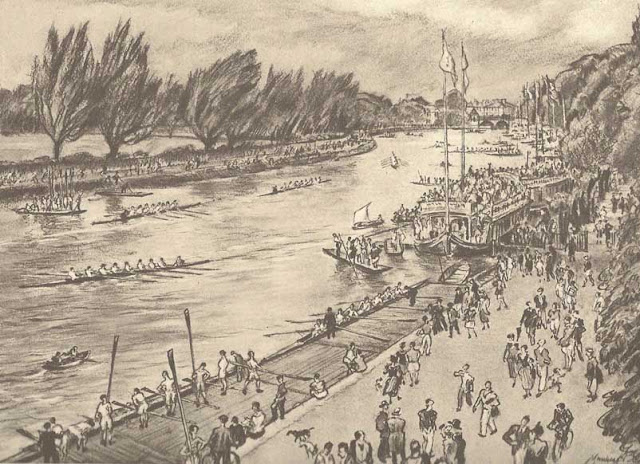Would we make it in time? Dawn was approaching, and our punt 'Jemima' was still way upstream of the bridge. Gradually though we became aware of other boats on the same mission: i.e., to get to Magdalen Bridge in time for the 6.00AM rendition of two Latin hymns by the choir of Magdalen College, Oxford. Going by punt is the traditional way of celebrating May Morning. That may be fine if you are an undergraduate with a college punt moored handily nearby: you and your girlfriend, possibly with another couple or two (punts are supposed to hold 5, but 6 is OK at a pinch) might be able to embark early on May morning, but we had had to punt down from the Upper Cherwell, and had even endured a night in sleeping bags on that little island near the Dragon School in order to get to the ceremony on time.
At about 5.55AM the bridge, already thronged with people, loomed up in the early morning mist, and our little flotilla joined dozens of other boats, the occupants - mostly students in dinner jackets and long dresses fresh from all-night College balls - gazing expectantly skywards. Suddenly the bells on the ancient college tower struck 6.00; the crowd, both those on the bridge and on the water heard the peels loud and clear, and we all fell silent. What followed though was unfortunately a bit of an anti-climax: the words of Hymnus Eucharisticus were rendered almost totally inaudible by the breeze and the distance from the top of the tower to the river beneath.
The scene I have tried to describe took place many years ago. I tend to go by bike now - when I wake up in time. We didn't really care about not hearing the music. After all, May Morning is an Oxford tradition. The choir has been climbing Magdalen Tower and singing the same music on 1 May for over 500 years. And in fact you can hear the singing now, as one innovation of recent years seems to be some sort of amplifier system on the tower.
Then as now, 10,000 people get up early and struggle down the High St for the ceremony. I suppose it must be in all the tourist literature, because I would say the crowd is about one third University, one third townsfolk like me, and one third visitors, including language students. I recall the last time I went I ended up having breakfast with two Japanese ladies who were in Oxford at some language school or other - I forget which.
If the hymns were all, I don't think I'd bother to go again. But that's just the start. The bells toll for the next 20 minutes, and the crowd slowly disperses back up the High towards Carfax. The first thing you see is the Morris dancers; most tourists seem to ignore these fine old rustic gentlemen these days, but I rather like the feeling of a tradition largely unchanged through the ages, and that, the Morrismen being largely townies, May Morning provides a nice link between Town and Gown. Passing by the Morrismen - perhaps now there are Morris ladies too - I haven't been recently to check it out - many folk head for breakfast. Lots of coffee houses and restaurants open early, and from what I've seen do a cracking business for most of the morning. It's a really nice scene, and revellers throng the High for hours, the Latin hymns quite forgotten.
If you go - and I recommend it even if you make it only the once - there are two things to remember. Firstly don't jump off Magdalen Bridge - it's dangerous! The Cherwell is not as deep as it looks, and you can break a leg. And secondly, for those learners who live beyond the bridge, you might experience delays as the whole area of St Clement's gets very busy. Having said that, you'll still make it on time for the News Review as the Council and the police have said the bridge is to remain open this year.
Kit Villiers







